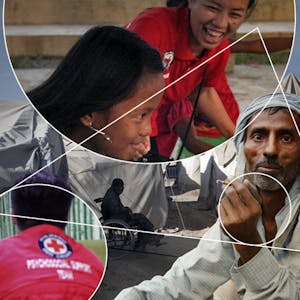Chronically Ill in an Emergency Why Mental Health Matters
In humanitarian settings, mental ill-health is powerfully inter-connected with other non-communicable diseases (NCDs) such as cardiovascular diseases, cancers, diabetes and chronic respiratory diseases. Integrating mental health and psychosocial support (MHPSS) with NCD prevention and care might therefore be useful, both to be more effective, and to require fewer resources. There is, however, a lack of widely accepted guidelines that take this into account, and this course is intended to draw attention to that issue.Attention to NCDs focused initially on four major disease categories (cardiovascular disease, diabetes, chronic respiratory disease and cancer) and four groups of associated risk factors (unhealthy diets, physical inactivity, tobacco use, and harmful use of alcohol). Recently, mental ill-health has been considered as the fifth NCD and environmental determinant as the fifth risk factor for NCDs – known as ‘5-by-5’ conditions.
The course has a threefold aim: i) to explore evidence of interaction between mental ill-health and other NCDs and the role of psychosocial support in humanitarian response; ii) to explore what is being done and where; what level the determinants of health are being addressed at and the integration of mental health and psychosocial support or MHPSS and NCD prevention and care in humanitarian response; and iii) to identify and explore challenges, opportunities and lessons learned for integrating MHPSS and NCD prevention and care in humanitarian response.
The MOOC will be led by a course leader from the University of Copenhagen in close collaboration with academic teachers, the Danish Red Cross and IFRC Reference Centre for Psychosocial Support, Copenhagen, Denmark.
None
Syllabus
Syllabus - What you will learn from this course
Week 1
Overview of MHPSS and NCD Prevention and Care in Humanitarian Response
Week 2
What is Being Done in Integrating MHPSS and NCD Prevention and Care
Week 3
Lessons Learned from Integrating MHPSS and NCD Prevention and Care
FAQ
When will I have access to the lectures and assignments?
Access to lectures and assignments depends on your type of enrollment. If you take a course in audit mode, you will be able to see most course materials for free. To access graded assignments and to earn a Certificate, you will need to purchase the Certificate experience, during or after your audit. If you don't see the audit option:
What will I get if I purchase the Certificate?
When you purchase a Certificate you get access to all course materials, including graded assignments. Upon completing the course, your electronic Certificate will be added to your Accomplishments page - from there, you can print your Certificate or add it to your LinkedIn profile. If you only want to read and view the course content, you can audit the course for free.
Is financial aid available?
Yes. In select learning programs, you can apply for financial aid or a scholarship if you can’t afford the enrollment fee. If fin aid or scholarship is available for your learning program selection, you’ll find a link to apply on the description page.
Reviews
I think that most of the quizzes were common-sense and did not require attention to the materials.
Really interesting, well presented and supported by current research
